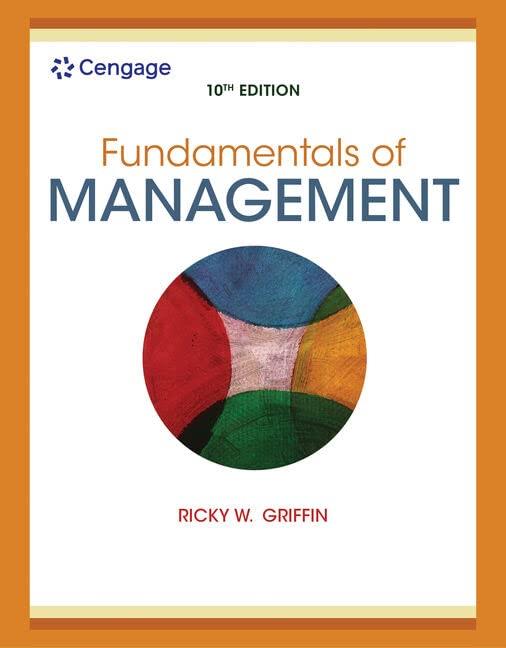Question
Case Study A group of research were interested in exploring resilience in the workplace. The researchers defined resilience as the process and outcome of successfully
Case Study
A group of research were interested in exploring resilience in the workplace. The researchers defined resilience as the process and outcome of successfully adapting to difficult or challenging life experiences, especially through mental, emotional, and behavioural flexibility and adjustment to external and internal demands. The researchers then created an interactive educational programme designed to foster resilience amongst employees. The focus of the study was to explore whether the programme was effective. The researchers began by obtaining permission to conduct the study from the University of the Witwatersrand Ethics Committee. Once permission was obtained, the researchers approached the CEO of a local corporate company located in the North of Johannesburg and obtained permission to carry out their study at this company. All company employees who agreed to participate (690 employees; 350 females, 340 males) in the study were asked to complete a brief demographic questionnaire as well as the Connor-Davidson Resilience Scale. The participants were randomly assignment to group A (345 employees) and group B (345 employees). All participants in Group A attended three two-hour presentations scheduled during the companys team building activities over two weeks during which they were presented with the interactive resilience educational programme. This included reading and discussing stories about specific coping strategies, watching videos and role-playing. Participants in Group B attended three two-hour presentations scheduled during the companys team building activities over two weeks during which they were asked to discuss their experiences of the team building activities. At the end of the two weeks, all of the employees (Group A and group B) were asked to re-complete the Connor-Davidson Resilience Scale. The Connor-Davidson Resilience Scale is a 10-item self-report scale which measures the preparedness of an individual to bounce back after a tragedy/trauma or stress events. The Connor-Davidson Resilience Scale is answered on a four-point scale ranging from not true at all (1) to true nearly all of the time (4). High scores indicate high resilience. Cronbach Alpha Coefficients for the Connor-Davidson Resilience Scale range from 0.68 to 0.77. The Connor-Davidson Resilience Scale has been found to relate positively with the Brief Resilience Scale. The scale was developed in English in the United States of America, and has not been widely used in the South African context. Analysis of the results indicated that there was a significant difference in the type of coping strategies utilised by employees in group A when compared to group B after the presentations; on this basis, the researchers concluded that the programme was effective. Instructions: Read Case Study 1 above and answer all of the questions that follow on the template provided.
Section A mark allocation: 30 marks
1. Identify whether the study in Case Study 1 is descriptive, correlational, or experimental. Briefly justify your answer. (2 marks)
2. Resilience is defined as the process and outcome of successfully adapting to difficult or challenging life experiences, especially through mental, emotional, and behavioural flexibility and adjustment to external and internal demands. What does this statement represent? (1 mark)
3. Identify the variables and the variable role for each variable in the study in Case Study 1. (4 marks)
4. What is the research design for the study in Case Study 1? Your answer should give details about all of the key design features in the study as well as the overall design and subtype. (6 marks)
5. To what extent were the researchers justified in drawing a causal conclusion for the study in Case Study 1? Briefly justify your answer by making reference to the three criteria for causality. (4 marks)
6. Identify the sample and the sampling strategy used in the study in Case Study 1. (3 marks)
7. Describe the response format for the Connor-Davidson Resilience Scale. (3 marks)
8. Cronbach Alpha Coefficients for the Connor-Davidson Resilience Scale. range from 0.68 to 0.77 across the different subscales. What type of psychometric information is represented in this statement and how should it be interpreted? (2 marks) 9. The Connor-Davidson Resilience Scale has been found to relate positively with the Brief Resilience Scale. What type of psychometric information is represented in this statement and how should it be interpreted? (3 marks)
10. Critically discuss whether there would be any concerns about bias when administering the Connor-Davidson Resilience Scale in the study in Case Study 1. (2 marks)
Step by Step Solution
3.45 Rating (152 Votes )
There are 3 Steps involved in it
Step: 1
1 Type of Study The study described in Case Study 1 is an experimental study This is justified by the fact that the researchers manipulated one variable interactive educational programme aimed at fost...
Get Instant Access to Expert-Tailored Solutions
See step-by-step solutions with expert insights and AI powered tools for academic success
Step: 2

Step: 3

Ace Your Homework with AI
Get the answers you need in no time with our AI-driven, step-by-step assistance
Get Started


